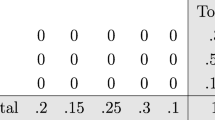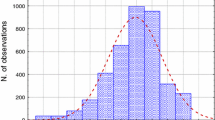Abstract
The need for scale conversion may arise whenever an attitude of individuals is measured by independent entrepreneurs each using an ordinal scale of its own with possibly different numbers of (arbitrary) ordinal categories. Such situations are quite common in the marketing realm. The conversion of a score of an individual measured on one scale into an estimated score of a similar scale with a different range is the concern of this paper. An inferential Bayesian approach is adopted to analyze the situation where we believe the scale with fewer categories can be obtained by collapsing the finer scale. This leads to inferences concerning rules for the conversion of scales. Further, we propose a method for testing the validity of such a model. The use of the proposed methodology is exemplified on real data from surveys concerning performance evaluation and satisfaction.





Similar content being viewed by others
References
Box, G. E. P., & Tiao, G. C. (1973). Bayesian inference in statistical analysis. New York: John Wiley and Sons.
Evans, M., Gilula, Z., & Guttman, I. (1993). Computational issues in the Bayesian analysis of categorical data: Loglinear and Goodman’s RC model. Statistica Sinica, 3, 391–406.
Evans, M., Gilula, Z., Guttman, I., & Swartz, T. (1997). Bayesian analysis of stochastically ordered distributions of categorical variables. Journal of the American Statistical Association, 92(437), 208–214.
Evans, M., Guttman, I., & Swartz, T. (2006). Optimality and computations for relative surprise inferences. Canadian Journal of Statistics, 34(1), 113–129.
Evans, M., & Jang, G. H. (2011). Inferences from prior-based loss functions. Technical Report No. 1104, Dept. of Statistics, U. of Toronto.
Evans, M., & Shakhatreh, M. (2008). Optimal properties of some Bayesian inferences. Electronic Journal of Statistics, 2, 1268–1280.
Green, P. E., & Rao, V. R. (1970). Rating scales and information recovery - How many scales and response categories to use? Journal of Marketing, 34, 33–39.
Miller, G. A. (1956). The magical number seven, plus or minus two: Some limits on our capacity for processing information. Psychological Review, 63, 81–97.
Rossi, P. E, Gilula, Z., & Allenby, G. M. (2001). Overcoming scale usage heterogeneity: A Bayesian hierarchical approach. Journal of the American Statistical Association, 96(453), 20–31.
Yakir, B., & Gilula, Z. (1999). An insightful comparison of brands on an arbitrary ordinal scale. Journal of the Marketing Research Society, 40, 249–264.
Acknowledgements
The authors thank the Editor and two referees for many helpful comments.
Author information
Authors and Affiliations
Corresponding author
Rights and permissions
About this article
Cite this article
Evans, M., Gilula, Z. & Guttman, I. Conversion of ordinal attitudinal scales: An inferential Bayesian approach. Quant Mark Econ 10, 283–304 (2012). https://doi.org/10.1007/s11129-011-9116-1
Received:
Accepted:
Published:
Issue Date:
DOI: https://doi.org/10.1007/s11129-011-9116-1




